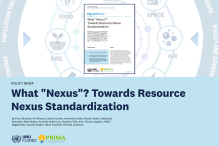On 23 August 2022, UNU-IAS hosted an online session on the topic of Valuing Water in Asia: Tools and Strategies at the annual World Water Week conference organised by Stockholm International Water Institute (SIWI). The session explored practical methods for economic valuation of water and their application in Asia, to promote better policies and strategies for water pricing and distribution, investment in water reuse, and greater societal appreciation for water. Over 80 international participants joined the discussion.
The session was organized in partnership with the Asian Development Bank (ADB), the University of Tokyo, and the UNU Institute for Integrated Management of Material Fluxes and of Resources (UNU-FLORES).
A keynote speech by Kensuke Fukushi (Academic Programme Advisor, UNU-IAS) outlined the value of water, emphasising the balance and harmony between economy and environment that are critical for achieving a sustainable society. He stressed the key role of scientific data and model development for making evidence-based judgments to communicate with water stakeholders.
Participants exchanged views and ideas during breakout discussions on three topics.
One discussion focused on tools for quantifying the value of water, and their application. It introduced a UNU-IAS framework to visualise water–economy interlinkages, as well as a recent study on water pricing policies in China. Geetha Mohan (Adjunct Professor, UNU-IAS; Professor, Toyama University) highlighted a new UNU-IAS report based on water research in India, Indonesia, Nepal, and Thailand, which provides valuable insights and approaches to improve environmental and economic policy.
In parallel, another discussion explored valuing water for industry. It provided insights on various water valuation approaches in practice and discussed barriers for sustainable water pricing and private and public investment in water management.
The other group discussion focused on the contingent valuation method and willingness to pay. It introduced the ADB approach to accounting for the value of non-market benefits and costs, and assessed the relevance of economic valuation of water, based on ADB experience and recent publications.
In closing, the outcomes of each discussion were shared. Serena Caucci (Associate Programme Officer, UNU-FLORES) then highlighted that valuing water was still an open topic, requiring financial means in particular but also integrated methods that look at new technologies and ways to overcome challenges that often have a social dimension.
A recording of the session will be available on the World Water Week YouTube Channel.



